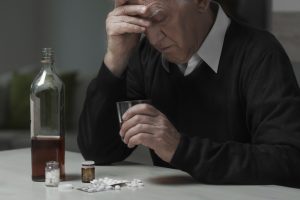 It is often advised to avoid alcohol consumption if you have kidney disease as it can result in kidney pain, among other complications. Furthermore, consuming over four alcoholic beverages can worsen kidney disease.
It is often advised to avoid alcohol consumption if you have kidney disease as it can result in kidney pain, among other complications. Furthermore, consuming over four alcoholic beverages can worsen kidney disease.
The CDC estimates at least two out of three Americans consume alcohol, and some drinkers consume over five drinks at a time. Twenty-five percent of drinkers have admitted they have consumed over five beverages in one occasion at least once in the past year. This is known as binge drinking and it is associated with severe kidney problems.
Advertisement
Even drinking regularly too much too often can damage the kidneys. Regular heavy drinking is associated with double the risk of kidney disease. The risk is even greater among those who drink and smoke.
When we consume alcohol, our kidneys work harder to filter this harmful substance. Too much alcohol causes the kidneys to overwork, contributing to damage. Alcohol also negatively affects the regulation of fluid and electrolytes, thus leading to dehydration in the cells. Furthermore, alcohol can disrupt the balance of hormones that affect the kidneys.
Alcohol can also negatively affect other bodily functions and processes that play a role in the health of the kidneys – for example, blood pressure.
Causes of kidney pain after drinking alcohol
Kidney pain after drinking alcohol may be immediate, or it can be a dull pain even if the drinking has stopped. Here are some common causes for pain of the kidneys after drinking alcohol.
- Your kidneys are overworking to filter out the alcohol
- You have a fragile renal pelvis and the excess amount of urine production leads to pain
- You have a pelviureteric junction (PUJ) obstruction
- You have kidney stones
- You have liver disease
Kidney pain can vary depending on the underlying cause. It may feel sharp, sudden, or excruciating, it may worsen at night, it may feel like a severe pain between the buttocks and lower ribs. The pain may radiate down, and it may be accompanied by fever, nausea, blood in urine, vomiting, and painful urination.
Safe levels of drinking alcohol for better kidney health
The recommended serving for alcohol is usually one drink, but the size of the drink can vary depending on the beverage. For example, one drink can be classified as 12 ounces of beer, five ounces of wine, or 1.5 ounces of hard liquor.
Having more than three drinks a day, or seven in a week, is problematic for your kidneys. Binge drinking refers to having more than five drinks in a two-hour period.
Pregnant women, seniors, persons taking certain medications, persons with smaller body build, or persons with certain medical conditions should avoid drinking alcohol as much as possible.
Tips to help you deal with your kidney pain and drinking problems
In order to maintain proper kidney health it’s important you consider some of the below tips.
- Eat a variety of foods, but all in moderation
- Avoid consuming the liquid from canned fruits and vegetables
- Limit high potassium foods in your diet (bananas, cantaloupe, figs, acorn squash, beets, lentils, etc.)
- Do not add salt to your food when cooking or eating
- Choose fresh or frozen vegetables over canned
- Avoid pickled foods like olives and dills
- Limit high sodium condiments such as soy sauce, ketchup, and BBQ sauce
- Snack on fruits and veggies instead of crackers and salty snacks
- Avoid butter, lard, and shortening
- Reduce your protein intake
- Avoid alcohol
Advertisement
In order to combat your drinking, it may be wise to start with a drinking diary so you can document how much you drink. With that information, you can create a plan to reduce your drinking. Try designating alcohol-free days, setting a budget on your alcohol spending, switching from harder liquors to a glass of wine, and increasing your water intake.
If you suspect you have a serious drinking problem you may wish to discuss it with your doctor or therapist.
Sources:
https://www.kidney.org/news/kidneyCare/winter10/AlcoholAffects
https://www.mayoclinic.org/diseases-conditions/chronic-kidney-disease/manage/ptc-20208364
//www.belmarrahealth.com/sodium-potassium-balance-in-diet-critical-in-chronic-kidney-disease-prevention/
